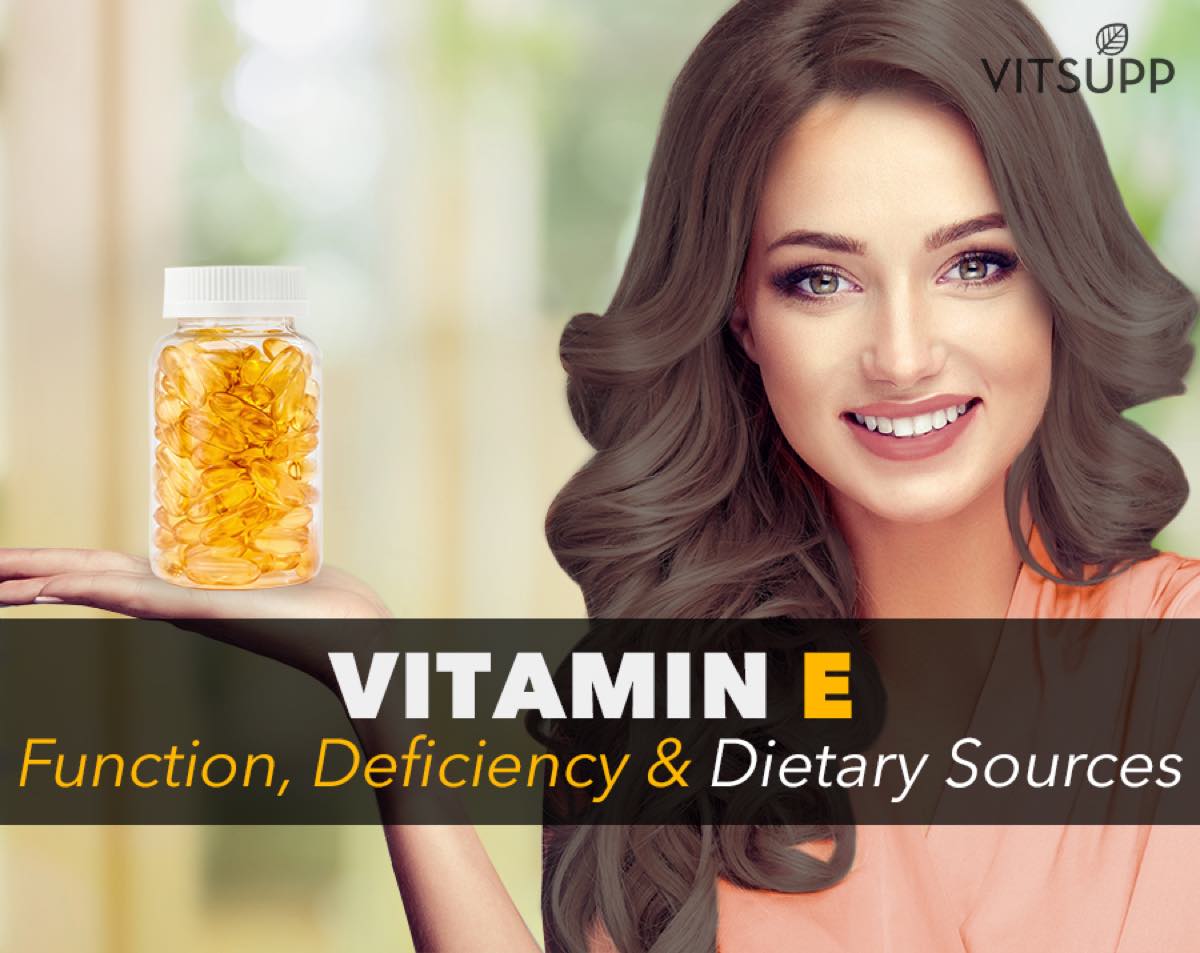Have you heard that vitamin E is great for your skin? But is that all that is to it? It is an essential nutrient, and its benefits go way beyond skin deep. To know more about it, read on.
We should start with some basic questions if we want to know more about this essential nutrient. How do we define Vitamin E and what does it do? What are some of the food sources of for it? Does the human body have the ability to synthesize it? Let us find out.
Contents
- What is Vitamin E? What does it do?
- What is the dietary recommendation for Vitamin E?
- Natural sources of Vitamin E
- Vitamin E Supplements
- Vitamin E Supplements- Possible Side Effects
- Uses of Vitamin E
- Benefits of Vitamin E
- Benefits of Vitamin E for hair
- Benefits of Vitamin E for men
- Causes of Vitamin E deficiency
- Health concerns due to Vitamin E deficiency
- Conclusion
What is Vitamin E? What does it do?
Vitamin E is a fat-soluble nutrient.
This vitamin’s essential antioxidant properties help in protecting damages caused by free radicals. Besides, our body needs it to boost its immune system. This further helps in fighting bacteria and viruses. (source)
It is contained in many food sources. This essential vitamin is also required by the cells for different physiological needs. It is vital in widening the blood vessels and also prevents blood from clotting inside vessels. (source)
What is the dietary recommendation for Vitamin E?
The amount of Vitamin E required by our body is dependent on age. Here is a complete list guiding the average daily recommended intakes. These have been mentioned in milligrams (mg) and International Units (IU). (source)
Recommended by the National Institutes of Health (NIH) Office of Dietary Supplements at the US Department Of Health & Human Services| Life Stage | Recommended Amount |
|---|---|
| Birth to 6 months | 4 mg (6 IU) |
| Infants 7-12 months | 5 mg (7.5 IU) |
| Children 1-3 years | 6 mg (9 IU) |
| Children 4-8 years | 7 mg (10.4 IU) |
| Children 9-13 years | 11 mg (16.4 IU) |
| Teens 14-18 years | 15 mg (22.4 IU) |
| Adults | 15 mg (22.4 IU) |
| Pregnant teens and women | 15 mg (22.4 IU) |
| Breastfeeding teens and women | 19 mg (28.4 IU) |
Natural sources of Vitamin E
It naturally occurs in 8 different forms, including four tocopherols (alpha, beta, gamma, and delta) and four tocotrienols. (3) Alpha-tocopherol is considered to be its most active form.
Fortunately, it is available in widespread in food sources. As a result, it is rare to develop a deficiency. But of course, in case the body’s ability to absorb nutrients is diminished due to some clinical issues, one may have a deficiency of this vitamin. (source)
Vitamin E is a common nutrient found in most foods. A few foods like cooking oil, seeds, and nuts, are exceptionally rich sources. According to RDA (Recommended Dietary Allowance), every adult requires 15 mg of Vitamin E in their diet.
To fulfil this, 20 food sources have been identified.
These are considered to be extremely rich in this vitamin. (source)
Foods containing fat are acknowledged to be high in Vitamin E. Sources like nuts, seeds, avocado, vegetable oils, and wheat germ are few that can be named here. (source)
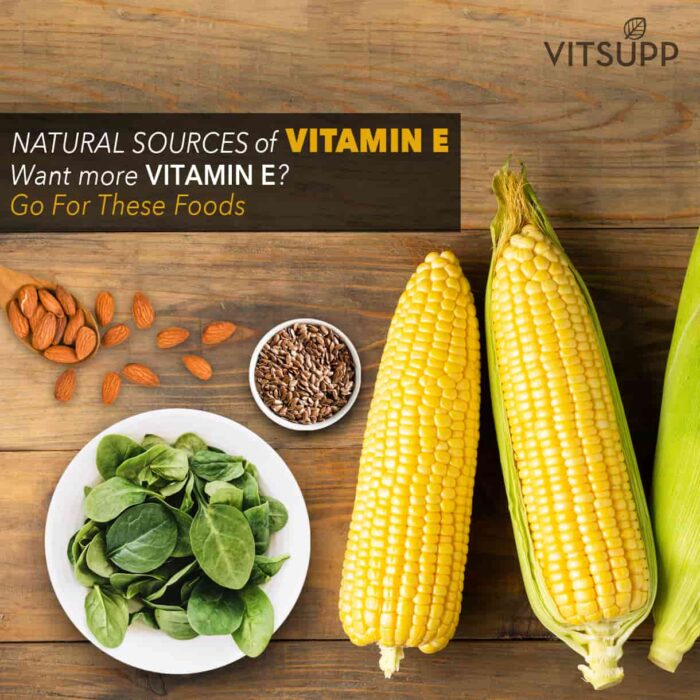
Dietary sources of Vitamin E – alpha-tocopherol
Some dietary sources of Vitamin E – alpha-tocopherol are:
- Nuts
- Seeds
- Vegetable oils
- Green leafy vegetables
- Wheat germ oil-
- Sunflower seeds
- Almonds
- Sunflower oil
- Hazelnuts
Dietary sources of Vitamin E – Gamma-tocopherol is:
- Soybean
- Canola
- Corn
The following chart would help you to understand in detail, all the Vitamin E rich sources. (source)
14 Daily Food Sources for better Vitamin E Absorption| Food source | Serving size | Vitamin E (mg) |
|---|---|---|
| Toasted almonds | 60 ml (1/4 cup) | 18 |
| Roasted sunflower seeds | 60 ml (1/4 cup) | 10-12 |
| Almond butter | 30 ml (2 tbsp) | 8 |
| Wheatgerm oil | 5 ml (1 tsp) | 7 |
| Wheat germ | 30 g (1/4 cup) | 5 |
| Avocado | 100 g (1/2 a fruit) | 4 |
| Peanuts | 60 ml (1/4 cup) | 3 |
| Peanut butter | 30 ml (2 tbsp) | 3 |
| Sunflower oil | 5 ml (1 tsp) | 3 |
| Canned tomato sauce | 125 ml (1/2 cup) | 3 |
| Cooked spinach | 125 ml (1/2 cup) | 2-4 |
| Cooked swiss chard | 125 ml (1/2 cup) | 2 |
| White tuna, canned in oil | 75 g (2.5 oz) | 2 |
| Sockeye salmon | 75 g (2.5 oz) | 2 |
The contribution of Vitamin E from Vegetable Oils as a potent source is worth mentioning here: (source)
Vitamin E in Vegetable oils| Oils | Alpha-tocopherol | G-tocopherol | D-tocopherol | A-tocotrienol |
|---|---|---|---|---|
| Coconut | 0.5 | 0 | 0.6 | 0.5 |
| Maize (corn) | 11.2 | 60.2 | 1.8 | 0 |
| Palm | 25.6 | 31.6 | 7.0 | 14.3 |
| Olive | 5.1 | trace amounts | 0 | 0 |
| Peanut | 13.0 | 21.4 | 2.1 | 0 |
| Soybean | 10.1 | 59.3 | 26.4 | 0 |
| Wheatgerm | 133.0 | 26.0 | 27.1 | 2.6 |
| Sunflower | 48.7 | 5.1 | 0.8 | 0 |
Vitamin E Supplements
Besides the dietary supplements, an adult might need 200 to 1,600 IU/day of Vitamin E, if prescribed by either a pharmacy or doctor. However, this is only recommended when the body is unable to absorb this essential nutrient. (source)
However, most people can acquire the required amounts from popular food sources. Hence the need for Vitamin E supplementation is a rarity. Being a fat-soluble nutrient, it is easily stored in the liver to be used on days when one is running low on the same. Usually, individuals on a low-fat diet have a lesser amount of this vitamin in their bodies. Besides, people who cannot absorb fat also exhibit low levels of it. (source)
In such a scenario, doctors usually recommend Vitamin E-400 capsules. (source)
One should consume this capsule as advised by the doctor or the pharmacist. It is important to take this medicine regularly for benefits. To avoid forgetting, one should consume this supplement at the same time every day. You should expect improvements of symptoms like numbness/tingling of the hands and feet and weakness. Immediate medical attention is needed in case you face serious health problems. (source)
Health care experts advise, consuming a diet that has antioxidant-rich foods like vegetables, fruits, whole grains and a moderate amount of unsaturated fats from vegetable oils, fish, nuts, and seeds. This would meet the recommended dietary needs for this essential nutrient. (source)
Vitamin E Supplements- Possible Side Effects
Supplements should be avoided in case you are suffering from any of the medical conditions listed below (source)
Medicines That React With Vitamin E Supplements
Talk to your doctor to know about possible drug interactions if you are taking any medicines regularly. There are some medicines that are known to interact adversely with vitamin E supplements:
- Anticoagulation and antiplatelet medications: Vitamin E inhibits platelet aggregation. This disrupts Vitamin K clotting factors. Hence there is a prepotential increase risk of bleeding combining these two.
- Simvastatin and niacin: Vitamin E can reduce the amount of high-density lipoprotein (HDL) which is the opposite desired effect of taking simvastatin and/or niacin. (source)
- chemotherapy drugs
- radiotherapy drugs
Side Effects Of Vitamin E Supplements
Excess of anything is bad. An overdose of this vitamin may lead to bleeding and haemorrhage. This applies to oral capsules, oral liquid, oral solution, and chewable tablets.
According to the National Institutes of Health, a dose greater than 400 units a day is considered dangerous. It may lead to blurred vision, diarrhoea, dizziness, nausea or even fatigue. One should immediately contact their health care provider if they notice any of these side effects.
Going beyond the recommended dose of 15 mg per day can lead to bleeding and haemorrhage.
Uses of Vitamin E
Vitamin E is an essential antioxidant that protects our cells from oxidative stress. Hence a good amount of the vitamin is needed for the proper functioning of the body. It is important in maintaining a sound immune system. It further helps in protecting our bodies against chronic health conditions like heart disease and even cancer. (source)
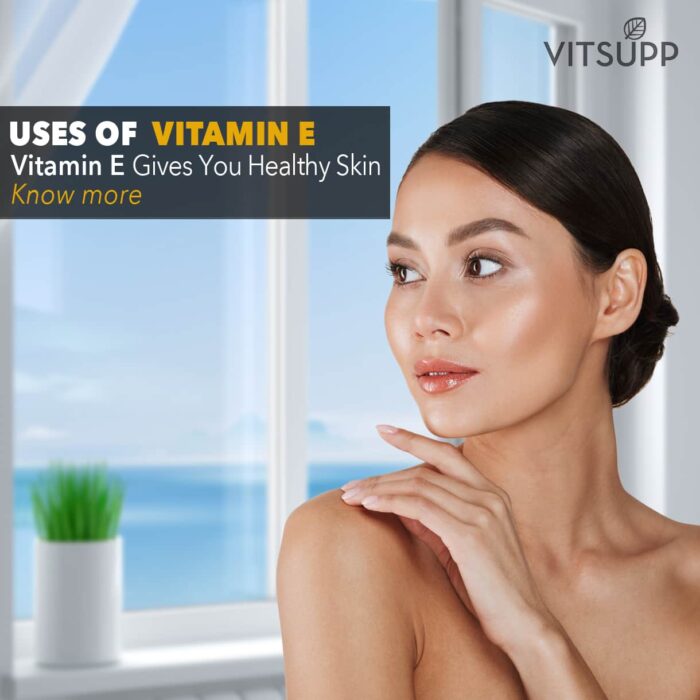
The other physiological uses are as follows-
1.Good antioxidant
As an antioxidant, it disables the production of damaging free radicals in tissues. It is also used as a commercial antioxidant in cases of hip and knee replacements. (source)
2. Regulates enzyme activity
As an enzymatic activity regulator, this vitamin plays a role in smooth muscle growth. (source)
3. Effects gene expression
Vitamin E also has an effect on gene expression. Scientists say that ageing is related to the dysregulation of genes of immune cells called T-cells. Studies show that supplementation has a positive effect on T-cells. Experiments conducted on mice revealed that proper administration of vitamin E affected T-cells, which had a significant effect in delaying ageing and associated degeneration of cells. (source)
4. It delays Alzheimer’s
It has been observed that a high dose of it might delay the progression of Alzheimer’s. This applies to those detected with a mild to moderate level of the disease. (source)
5. Other vital roles of Vitamin E
It also plays a role in neurological functions and protects lipids. It also might improve symptoms of non-alcoholic fatty liver disease. (source)
6. Treating chronic anaemia
Vitamin E improves our body’s response to the drug erythropoietin, which helps increase blood count in adults and children on hemodialysis. (source)
7. Treating beta-thalassemia
Medical experts say that consuming these vitamin supplements can possibly benefit children suffering from a blood disorder called beta-thalassemia. (source)
8. Prevention of leakage of intravenous chemotherapy drugs in veins and tissues
Application of Vitamin E along with dimethyl sulfoxide (DMSO) helps in preventing leakage of intravenous chemotherapy drugs in surrounding veins and tissues. (source)
9. Help repair nerve damage in hands and feet post-cancer drug treatment
Consuming Vitamin E (alpha-tocopherol) before and after the treatment with the cancer drug cisplatin can help repair nerve damage. However, substituting cisplatin with oxaliplatin does not help. (source)
10. Relieve menstrual cramps
Taking it along with Fish oil 2 days prior and 3 days after bleeding can reduce menstrual cramps considerably. (source)
11. Improving glomerulosclerosis in children
Medical experts show evidence that taking it orally can improve kidney functions in children suffering from glomerulosclerosis. (source)
12. Help in reducing the effects of G6PD deficiency
Taking Vitamin E orally along with or without selenium reduces the impact of the inherited disorder called G6PD deficiency. (source)
13. Reducing skin sores
Applying it helps to reduce granuloma annulare, which are skin sores. (source)
14. Improve early symptoms of Huntington disease
Consuming this nutrient in its natural form (RRR-alpha-tocopherol) helps in improving the early signs of Huntington disease. Though it does not help when the symptoms have aggravated. (source)
15. Prevent intracranial haemorrhage, (bleeding in the skull) in premature babies
Oral consumption of it helps in preventing bleeding in the skull among premature infants. (source)
16. Increase fertility in men
Its consumption helps men improve their fertility. However, combining Vitamin C and E does not show the same. (source)
17. Prevent nitrate intolerance
Health experts show some evidence that daily consumption helps in preventing nitrate intolerance. (source)
18. Reduce inflammation and liver markers in adults or children with nonalcoholic steatohepatitis or NASH.
Daily consumption of this essential nutrient in adults and children with NASH helps reduce inflammation and liver markers. (source)
19. Lower the risk of Parkinson disease
People who consume adequate amounts of it daily in their diet lower their risks of contracting Parkinson disease. However, taking supplements after one has been diagnosed with the disease may not help. (source)
20. Recovery from laser eye surgery
Taking vitamin A and E (alpha-tocopheryl nicotinate) improves the after-effects of laser eye surgery. (source)
21. Reduce signs of PMS (PREMENSTRUAL Syndrome)
Oral consumption helps some women in reducing their anxiety, depression, and craving during this period. (source)
22. Improve muscle strength in elders
Research confirms elders can improve their muscle strength and physical performance if they consume this essential vitamin. (source)
23. Treat scars caused by radiation
Consuming it with the drug pentoxifylline treats tissue scarring caused by radiation. (source)
24. Prevent retinopathy in premature babies
Premature infants who consume this vitamin orally have fewer chances of retinopathy. (source)
25. Reduce pain caused due to Rheumatoid arthritis
Prescribing it along with the standard treatment for Rheumatoid Arthritis can help in reducing the pain but not the swelling. (source)
26. Treat sunburns
Consuming of Vitamin E (RRR-alpha-tocopherol) and C protects the skin from the damages caused by UV rays. (source)
27. Prevent symptoms of tardive dyskinesia (a movement disorder) to become worse
Some researches show that oral consumption of it prevents symptoms of a movement disorder called Tardive Dyskinesia; while others say that it prevents the symptoms from becoming worse. (source)
28. Improve vision in uveitis
Taking Vitamin C and E orally helps in improving the vision in uveitis. However, it does not reduce the swelling caused by this condition. (source)
Benefits of Vitamin E
Vitamin E is a strong antioxidant that helps in reducing free radical damage and slows down the ageing process of your cells. This has been supported by the National Institutes Of Health.
Vitamin E helps those who are prone to high risk of ageing due to smoking. Prolonged smoking increases free radicals in their bodies. This is also attributed to prolonged exposure to pollution and high exposure to ultraviolet rays. It is vital in protecting damaged cells.
1. It plays an important role in protecting the skin from damage caused by free radicals. It also supports healthy immune function.
2. It is more effective in its tasks when combined with additional vitamins.
Benefits of Vitamin E Oil
One of the basic derivatives of this is Vitamin E oil. This can be directly applied on the skin or mixed with lotions and cream. It is a common ingredient in most of the anti-ageing products. It has many cosmetic applications. Many say these oils act as essential antioxidants, but this is debatable.
Some of the common benefits are listed below-
- Moisturizing the skin
- Healing wounds
- Preventing skin cancer
- Reducing skin itching and Eczema
- Psoriasis
- Minimizing or preventing the appearance of scars
- Treating or preventing fine lines and wrinkles
- Protection against sunburn
- Promoting nail health
However, talk to a doctor before self-medicating or making any topical applications.
Benefits of Vitamin E for hair
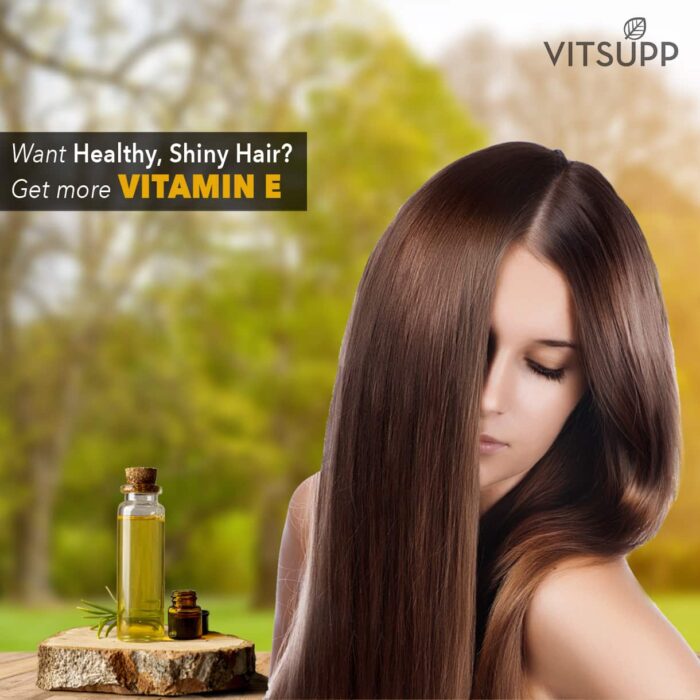
Some early researches show that Vitamin E can help in the overall scalp and health of the hair. However, scientists and other health care experts are still working on this theory. Here are some ways in which it can be good for maintaining a healthy mane. (source)
1. Preventing hair loss
Vitamin E helps people with hair loss problems. Being an antioxidant, it prevents oxidative stress. Oxidative stress is related to hair loss. (source)
2. Improving scalp circulation
It increases blood flow. This improves hair health. This is the reason almond oil is considered to be one of the most effective oils for hair growth; because almonds are rich in it. More research is being carried out in this area. (source)
3. Balancing oil production and preventing scalp flaking
Vitamin E is integral in creating a protective barrier on the skin. This barrier locks moisture, keeping the scalp well-nourished. This, in turn, prevents the scalp from drying out and flaking. (source)
4. Adding shine
A good Vitamin E enriched hair oil can add shine to the hair, making it less frizzy and dull. (source)
5. Supporting a healthy scalp
Vitamin E supports the scalp health. It gives your hair a strong base to grow from by reducing oxidative stress and preserving the protective lipid layer. (source)
You can apply Vitamin E directly to the hair, in the form of shampoo, conditioner, mask or oil. It is important to know, what you eat is directly linked to the health of your hair. A diet without calories, protein, or micronutrients can impact your overall hair condition. Some cosmetologists or dermatologists may even suggest crushing some supplements into your hair oil before applying it.
Hair oils with this vitamin need dilution before use. They are often too dense. Exposure to air often oxidizes them.
Here are some such hair oils-
1. OGX Healing + Vitamin E Penetrating Oil (3.3 ounces) (Amazon)
2. Ancient Greek Remedy Oil (Amazon)
3. Maple Holistics Avocado Oil (Amazon).
How to use Vitamin E hair oil?
1. Massage it onto your scalp.
2. Comb gently using a wide-tooth comb.
3. Let the oil sit for at least 15 minutes.
4. When you’re done, wash the oil out of your hair with your regular shampoo.
5. If your hair already feels well moisturized, you can skip conditioner.
Benefits of Vitamin E for men
Vitamin E is a nutrient that is beneficial for men and women. Though it is easily available in most food sources, it does not stop people from taking supplements or applying skin creams. And men are not far behind in this regard. (source)
Here is how men can reap their benefits-
- As we said earlier, it is great for hair. Men who want to maintain their beards may benefit from its intake.
- It helps in fighting acne. Men often develop acne due to hormonal imbalances, and it may help them clear up their skin.
- Some research indicates that this vitamin helps a man boost his libido. (source)
Causes of Vitamin E deficiency
Deficiency of this vitamin is rare in humans. Common causes of its deficiency in the developed countries are-
- Cystic Fibrosis
- A prolonged case of chronic pancreatitis
- Premature birth weight in babies.
- Cholestasis
- Primary biliary cirrhosis
- Crohn’s disease
- Short bowel syndrome
- Genetics is also one of the reasons behind the deficiency. It often runs in the family.
Congenital abetalipoproteinemia, a rare genetic disease, and Isolated Vitamin E Deficiency are medical conditions that lower its levels in the human body. - Sometimes Ataxia is also responsible.
This is a genetic disorder, mostly develops in children between 5-15 years of age. Ataxia is a neurological disorder that interferes with muscle control and coordination.
Health concerns due to Vitamin E deficiency
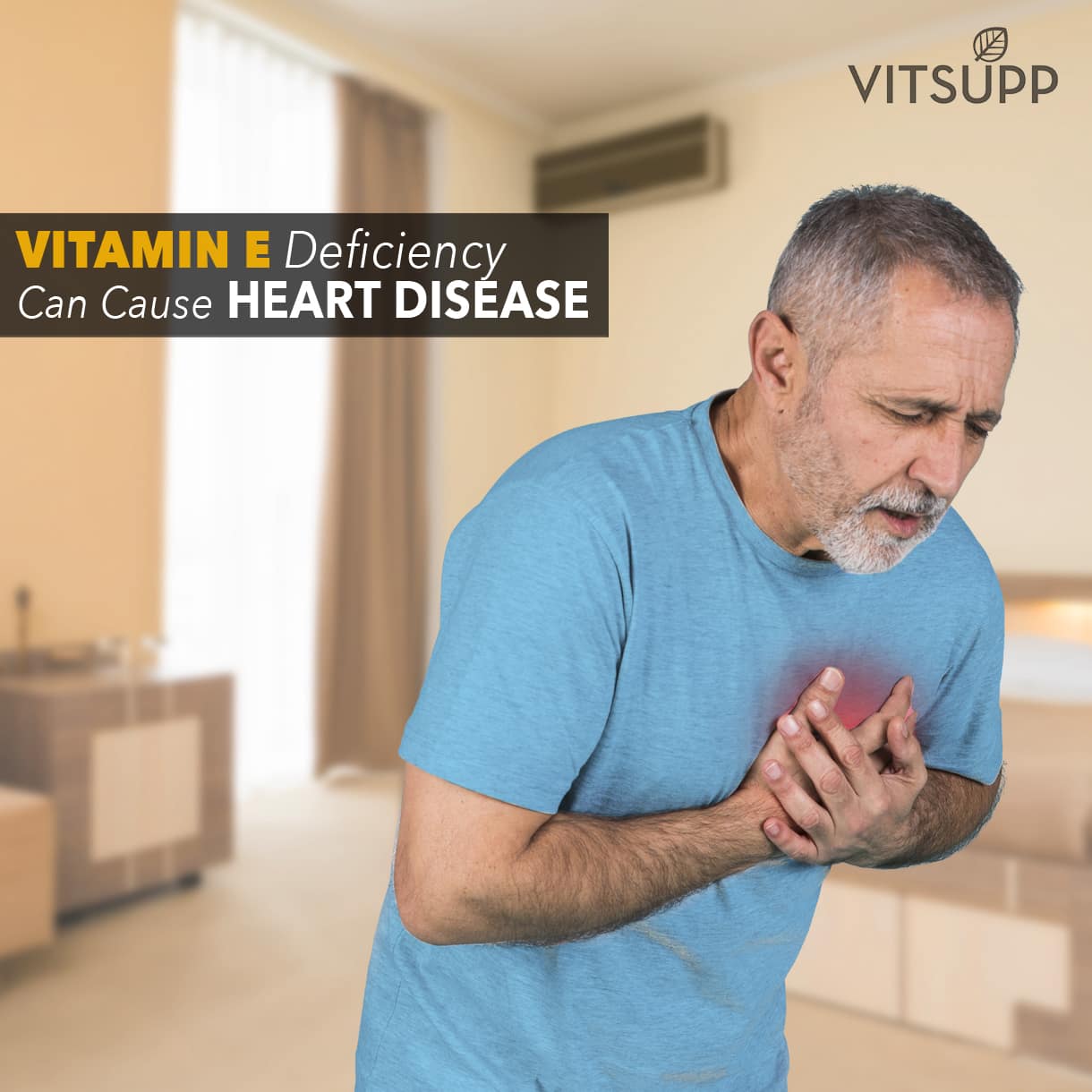
Symptoms of vitamin E deficiency are subtle. The following clinical effects are documented below:
- Cancer
- Heart Disease
- Hemolytic anaemia
- Neurological disease (including ataxia)
- Muscle weakness- Vitamin E is critical to the central nervous system. Its absence causes oxidative stress which eventually weakens the muscles.
- Difficulty in walking and coordination caused by damage to the Purkinje neurons.
- Peripheral Neuropathy resulting in numbness and tingling sensation
- Its deficiency weakens the light receptors in the retina and other cells in the eyes. This results in vision deterioration.
Interactions with dietary factors
It is significant to note that Vitamin E is heavily dependent on vitamins C, B3, Selenium and Glutathione. A diet high in only Vitamin E cannot give the desired results. (sources)
More attributes of Vitamin E
Vitamin E is also found as conjugates that enhance stability however this requires cellular metabolism for activation. Sebum, an important element provides this vitamin to the skin. Health care experts suggest a topical application to the skin in case a deficiency develops. It is useful in absorbing energy from ultraviolet light, which aids in photoprotection thus reducing the adverse effects of free radical damage to the skin. This vitamin might have anti-inflammatory roles. (source)
Vitamin E : A Way Forward
Though it is a dynamic nutrient that is highly responsible for the smooth functioning of the entire immune system, there are ongoing researches to get a clearer insight. It is available commercially as a variety of synthetic derivatives, but the limited cellular metabolism in skin layers makes the use of such products undesirable. One must note that using unesterified vitamin E, (similar to that found in natural sources), has provided the most consistent data concerning its topical efficacy. The vitamin E family that consists of eight different tocopherols and tocotrienols, will be important for future studies to determine if one or more of these molecules can have unique effects on skin function or not. (source)
Conclusion
Antioxidant vitamins, including vitamin E, came into public attention in the 1980s. By then scientists had begun to understand that free radical damage was involved in the early stages of artery-clogging atherosclerosis. According to their studies, this might also have contributed to cancer, vision loss, and a host of other chronic conditions.
It was also proven that it has the ability to protect cells from free radical damage as well as stop the production of free radical cells entirely. However, conflicting study results recently have dimmed some of the promises of using high doses of it to prevent chronic diseases. (source)
It is a major fat-soluble nutrient. It is present in the cell antioxidant defence system. This is exclusively obtained from the diet. In rare cases where the body fails to absorb fats, doctors can recommend supplements.
Oxidation is linked to diseases like cancer, ageing, arthritis, and cataracts. Being an important anti-oxidant, this essential nutrient can fight against these. Atherosclerosis caused by platelet hyper aggregation can also be prevented by Vitamin E. It also helps to reduce the production of prostaglandins such as thromboxane, which causes platelet clumping. (source)

